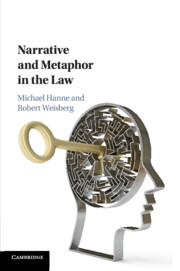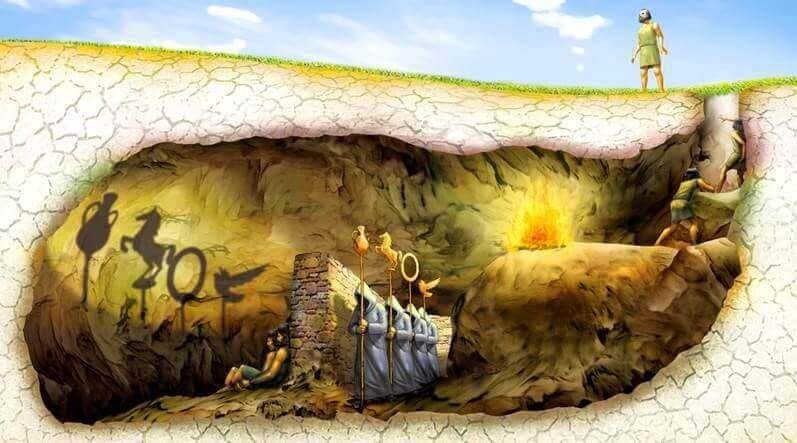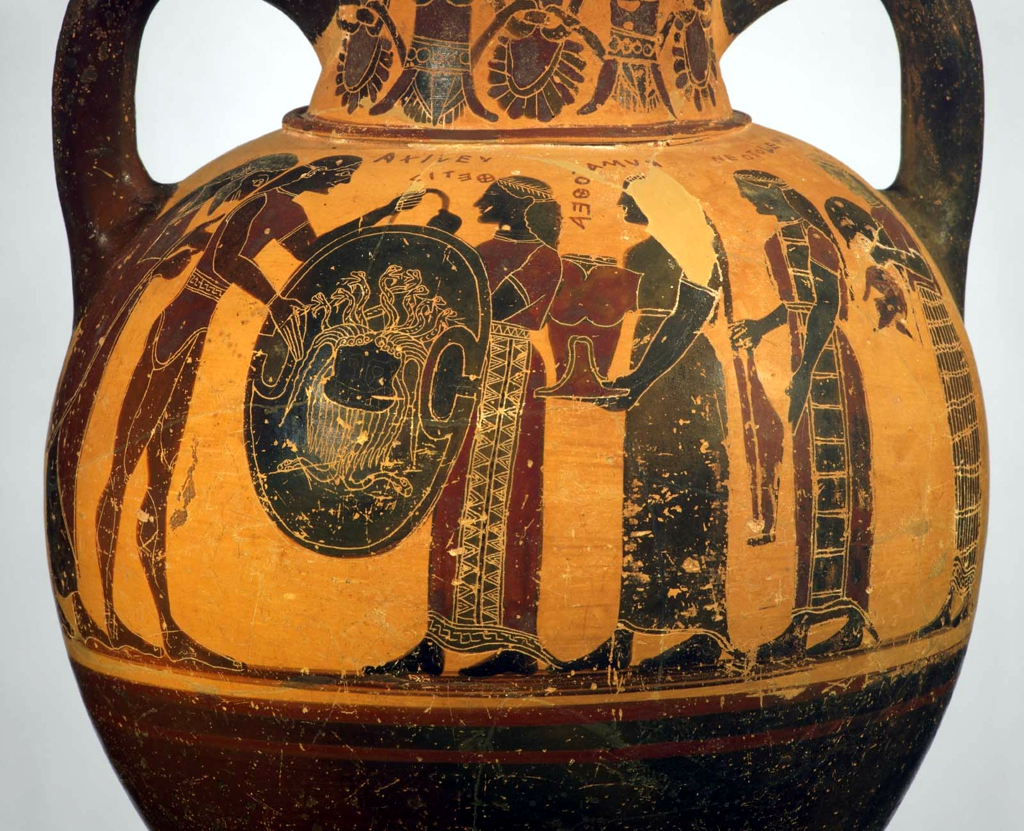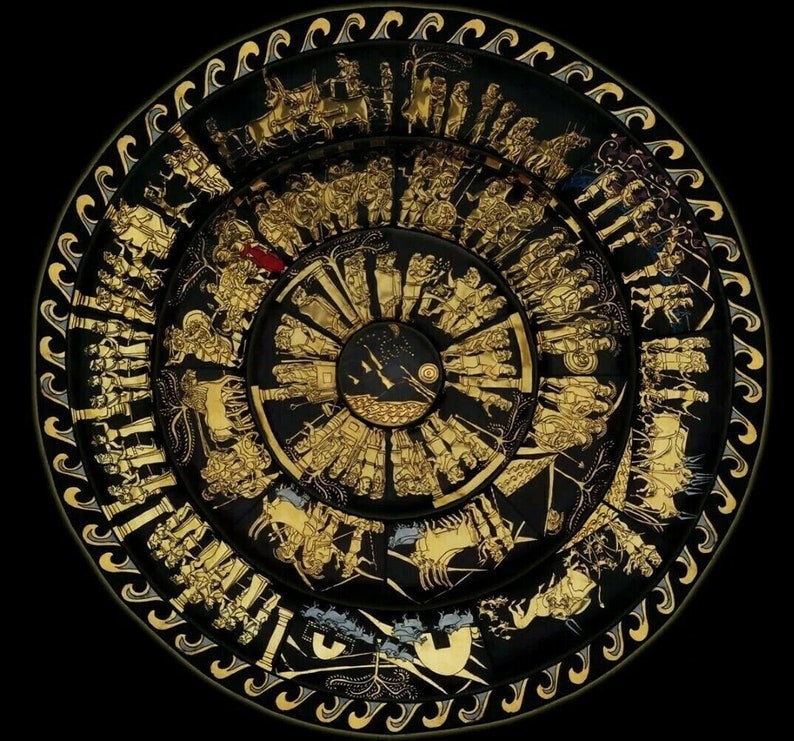"Allegory" in Homer
With "plot" we found that there are several elements, all of which
can be referred to as "plot," which means one should be careful to
understand what is meant:
- a bunch of events,
- a sequencing of those eventsin time
- a causal sequencing of those events
- a more specific causal sequence of events: a complication of
a situation, a climax of that complication, and a resolution
The following is probably not referred to as "plot" but is an
aspect of it
- order of exposition vs. temporal order
- often the events are presented in the order in which they
occurred
- sometimes that order is changed up
- parallel events are told
- flashbacks
- flash-forwards
But that was last time: this time, let's talk about the following:
- What's the difference, if any, between
"allegory," "metaphor," and "analogy"

Mike Dawson, in
https://slate.com/culture/2016/05/an-allegory-is-not-the-same-as-a-metaphor-in-praise-of-the-medieval-literary-tradition.html

Cover of a book:
https://www.cambridge.org/core/books/narrative-and-metaphor-in-the-law/9A11F94DAE675D7FA359846185273A61

https://www.google.com/search?q=analogy+image+cave&client=firefox-b-1-d&sxsrf=APq-WBv1SWLiCilxLbsXnBzt0xTv3jOXgg:1645013330014&source=lnms&tbm=isch&sa=X&ved=2ahUKEwiolr6ZmIT2AhXhj4kEHbrdCDsQ_AUoAXoECAEQAw&biw=1130&bih=574&dpr=2.22

https://www.studiobinder.com/blog/platos-allegory-of-the-cave/
The following are the components I can think of that make up what we
call metaphors, similes, analogies, allegories, and several other
figures of speech:
- putting two different things together
- equating two things that are different
- claiming a similarity between two things that are different
- scope of application:
- how is it focused in terms of what it refers to?
- remember there are two things: it can be focused in some
way on either thing
- focused on one thing? applicable to the the whole world?
Some range in between?
- how is it focused in terms of the story
- is it only applicable for an instant?
- does it permeate the whole story?
- a surface meaning v. a disguised/secret/hidden/real/discovered
meaning
Questions that occur to me:
- can the range of application be expanded beyond what is
explicitly mentioned? How far?
- how does the intention of the creator matter vs. how others
view it?
- what use is it put to: aesthetic? moral? argument?
teaching/illustrating?
In the end, this bunch of terms used in different ways by
different people is a perfect illustration of why certain people,
like me, keep harping on the fundamental importance of defining or
at least understanding one's terms at the start of anything if you
want it to be clear.
- What is "allegory"?
- There is a very good argument that "allegory" should be used
only for things like the book Pilgrim's Progress and
other works that are allegorical in the sense that they are
created as and intended to be read as allegories and are
typically obviously allegorical.
- These allegories rub your nose in the idea that things are
not what they seem: a story about how the character Folly
stumbled through life with her sister Intelligence and her
mother Perseverance and her father Lazybones is that kind of
allegory: it wears on its face the fact that you are
supposed to read it as standing for something else.
- typically, the allegory permeates the whole story
- and the surfaces story is pretty much beside the point,
not the message being conveyed
- One common meaning of 'allegory' is a little bit different
from that: it involves any story in which the surface
meaning of a text differs from another meaning that is also
somehow present in the text, and that other meaning is the
'real' meaning, the 'true' meaning, or perhaps merely "read
into" the text for some purpose.
- Whether or not that looser meaning is your meaning of
"allegory," it's the one used here.
- The Odyssey has been seen as an allegory for every
person's journey through life.
- The Iliad has been seen as an allegory for the
same thing: we are all like Achilles, faced with a choice
between safety and risk, or perhaps between following our
passion and following our cooler more reasonable self.
- The shield of Achilles is often seen as an allegory of the
whole Homeric Society: it is the go-to place for
finding societal things in peace time.
- Nowhere in Homer does it say that Odysseus is an allegory
for every person, or that the Iliad is, or that the
shield of Achilles illustrates all of society.
- Note how Cavafy's poem "Ithaki" used "Ithaca" as a
life-destination of some sort: that was an allegorical
reading of the Odyssey: arguably, it had to ignore
many things in the Odyssey and so is not "true" to
the Odyssey, but it is also arguable that it reached
deeper truths by doing so.
- Sometimes the author of a text intends the allegory:
- When Phoinix talks (Iliad 9.500ff.) about "Prayers"
and "Blindness" and urges Achilles to control his anger,
that is allegory, 1) because it uses characters called
"Prayers" and "Blindness," but also 2) because although
Phoinix seems to be talking about characters called
"Prayers" and another character called "Blindness" that roam
around and do things, he is really saying that if
Achilles rejects the embassy, divine retribution may fall
upon him.
- For Prayers are the daughters of great Zeus, halting
and wrinkled and of eyes askance, and they are ever
mindful to follow in the steps of Sin. [505] Howbeit Sin
is strong and fleet of foot, wherefore she far
out-runneth them all, and goeth before them over the
face of all the earth making men to fall, and Prayers
follow after, seeking to heal the hurt. Now whoso
revereth the daughters of Zeus when they draw nigh, him
they greatly bless, and hear him, when he prayeth; [510]
but if a man denieth them and stubbornly refuseth, then
they go their way and make prayer to Zeus, son of
Cronos, that Até may follow after such a one to the end
that he may fall and pay full atonement. Nay, Achilles,
see thou too that reverence attend upon the daughters of
Zeus, even such as bendeth the hearts of all men that
are upright.
- That particular allegory is presented in such a way that
we must conclude that the character Phoinix intends
what he says to be allegorical, and hence the bards were
aware of that too as they sang the poem and put those words
into it.
- So we at least know that allegory in the stricter sense
identified above was in the bards' toolkit: it occurs
once, quite explicitly.
- But does that justify reading other parts as allegory
that are not so clearly meant as allegory?
- Well, first off, all of the "allegorical" readings we
are talking about are different from Phoenix' little
speech
- Phoenix talked of Prayers and Sin as characters: that
is transparently allegorical and gives itself away
- the readings we are talking about involve first
translating the names into what they "really" are
(Athena >> Wisdom, Odysseus >> Everyhuman,
etc.)
- SO the "allegory" that the bards used was very rare, and
it was different
- Let's call what we're talking about "allegorizing": it
takes a text and does some work on it, transforms it into
something with a point, a message
- Is doing that 'presentist' (applying anachronistic ideas
to a text?), whether it is done by an ancient Greek or us?
- Is it just another way to read?
- What legitimacy does it have?
- Sometimes a text is 'allegorized' after the fact.
- That is, in my opinion, the case with all allegorical
readings of Homer aside from a very few instances of
allegory within the text, like the allegory in Phoinix's
words above.
- That does not make the allegory wrong. It just means it is
different from one that the author is putting in there
intentionally as an allegory.
- Later, but still ancient, Greeks allegorized various
elements of Homer:
- Theagenes of Rhegium (6th c. BCE, so very early)
interpreted Iliad 21, when the gods fight
against each other, as a conflict of physical "elements"
(hot and cold, dry and wet, etc.).
- so it was a chemical/physics allegory! kinda...cool?
-

- https://slidetodoc.com/ways-of-interpreting-myth-the-web-of-myth/
- this is an attempt to 'purify' myth
- it might even be called "co-opting" myth: taking it
for one's own in a way not true to myth's origins
- Pherecydes of Syros (earliest prose writer, 6th c. bce)
interpreted Zeus' talk of the golden chain by which he hung
Hera by her feet once as allegorical for the structure of
the universe!
- Whether or not any Homeric rhapsode was aware of such a
potential meaning (I think they likely were not, or at
least not concerned with them),
- Why did those Greek do this?
- ...those readings are interesting historically in many
ways. They are trying to connect the burgeoning
proto-scientific efforts of the Greek with their myths and
broader cultural understanding of the world: here is an
impressive bit of ancient Greek pure science:
Eratosthenes' method of measuring the circumference of the
earth (he got VERY close): what these allegorizing
readings were doing was to try to keep the science AND
Homer, even though Homer was, on the surface, at the
veryleast unconcerned with science, and at worst
incompatible with it,

- Public Domain, <a
href="https://commons.wikimedia.org/w/index.php?curid=877028">Link</a>
- Plato and Xenophanes were uncomfortable with the
immorality of the gods and so they interpreted immoral
divine acts as allegorical (when Kronos castrates Ouranos,
for instance, or when Ares and Aphrodite commit adultery and
are caught) or rejected the stories altogether.
- Xenophon, a Socratic and a historian of the Classical
period (5th c. BCE) writes that Odysseus is spared because
he did not indulge his appetites to excess as his companions
did: a moral allegory? perhaps not an allegory but merely an
application of a moral onto the story.
- Xenophon's reading is tendentious and selective: it
ignores that Odysseus did indulge his appetites with
Kalypso, with the Sirens, etc. We might counter Xenophon's
reading and say that Odysseus just got lucky?
- These ancient efforts are very short, just suggestions, a
few sentences, not full-fledged retellings.
- This has been a far from complete tour of "allegorical"
efforts to deal with Homer.
- We have no explicit evidence that the bards tried to put
'allegorical' or 'hidden' meanings into their poems, or
thought about it
- But starting in the archaic age, we find more and more
efforts to read Homer as having some sort of privileged
meaning below the surface level of the story.
- This continues all the way up to our time.
- In modern times, the only allegorical readings that I have
found taken seriously as helpful interpretations of the poem
rather than allegorizations perpetrated by particular
individuals are the idea of Odysseus as every human, the
choice of Achilles as a generic human plight, and the idea of
the shield of Achilles as a microcosmic representation of the
whole world.
- That does not mean that allegorizations are in any way
inferior readings.
- It means they are less informative about the bards and the
creation of these poems
- The allegorizations are more informative about the times
when the allegorizations occurred and how Homer was received
then.
- That is part of "reception history" a big field of
literary/cultural/intellectual studies particularly in
Classics
- Buy it now: "genuine ancient greek Achilles' shield":
- https://www.etsy.com/listing/1116787579/genuine-ancient-greek-achilles-shield-36?gpla=1&gao=1&&utm_source=google&utm_medium=cpc&utm_campaign=shopping_us_a-accessories-costume_accessories-costume_weapons&utm_custom1=_k_Cj0KCQiA3rKQBhCNARIsACUEW_bGdAM2OzD5lI6fQB99EBdP9QEdmM-eyrXLLqyiM-D0ZgNXLKuuiHgaApe0EALw_wcB_k_&utm_content=go_1844702565_65111515330_346428849815_aud-301856855918:pla-353036817099_c__1116787579_529097145&utm_custom2=1844702565&gclid=Cj0KCQiA3rKQBhCNARIsACUEW_bGdAM2OzD5lI6fQB99EBdP9QEdmM-eyrXLLqyiM-D0ZgNXLKuuiHgaApe0EALw_wcB
-
-

-
The Arming of Achilles, Archaic Greek Black-figure Neck Amphora
by the Camtar Painter, ca. 550 BCE.from Boston Museum of Fine
Art
- https://theshieldofachilles.net/2018/08/14/thetis-delivering-achilles-shield-in-art-through-the-ages/sc251462-2/
- link to MFA: https://collections.mfa.org/objects/153416?image=4
- In general, why allegorize Homer?
- In ancient times:
- Because one is shocked by Homer and wants to save the text
from being outrageous.
- Or because one has a pet theory, Homer is a renowned
foundational cultural authority, and so one wants to find
support in Homer, to claim Homer is on one's side.
- Because one thinks that previous thinkers, starting with
Homer, were on the right path but didn't quite get things
right or clear: this may not be allegory: it may be just
part of the history of ideas, or an instance of "progress."
- Or maybe one wants to claim Homer as a predecessor for
reasons that have little to do with whether or not Homer
ever even imagined what you say is there.
- Because one thinks that mythology is a revelation of truth
that requires laborious interpretation to discover its
hidden truths (many say stoics thought that, but a more
careful reading of the stoics would reject that in favor of
a much more interesting an nuanced view that we don't have
time for, unfortunately).
- Because one wants to show that Homer contains worlds, is
all-purpose, and anticipated all later intellectual
developments (i.e. Homer is one's foundational text and so
one must defend Homer wherever people claim he is lacking:
sort of like people who claim that Genesis really just tells
the story of evolution).
- This is akin to the rather common phenomenon of "Golden
Age" attitudes:such attitudes think there was a golden age
in the past: the past was better, superior, and if we
could just get back to that golden age, all would be well.
- In modern times:
- Shield of Achilles: it is a huge episode, and one wants a
reason for that. If it is mean to represent the world order
and human's place within it, that would be a fitting reason.
And that Achilles, the hero who is facing two options for
how he should fit into the human world, get the shield is
also fitting.
- It is an artistic reason
- Another reason, one that is not at all incompatible with
that, is that the "Shield of Achilles" was a separate
song, or separable episode, in the bardic toolbox, and
whoever stitched together Iliad shoehorned it in
where it is.
- Odysseus as every human: why that allegory? is it that one
wants to explain the appeal of the poem across ages?
one thinks that it fits into a much larger pattern that pops
up all over in human culture (hero's journey)? one wants to
compare visions of what it means to be human, and thinks
that there must be one in Odyssey, and Odysseus
represents it?
- Is it sufficient as a representation of all humans?
- compare Lord of the Rings: many people see those
hobbits as Christian heroes, namely as humans caught in a
world full of forces greater than themselves, bumbling
through among forces beyond their control, and yet having to
deal with that world as best they can, and triumphing.
Others think that the one ring is allegory for nuclear
weapons. But Tolkien himself, the author, rejected
allegorizing his work! Does it matter what he thought?
- Contrast that with George Orwell's Animal Farm,
which is clearly allegorical in intent, albeit one must
first 'allegorize' it by identifying what the various
animals stand for. Less so, Lord of the Flies is
allegorical. Are all texts somehow allegorical? or at least
allegorizable?

Dr. Seuss' 'sneetches'






